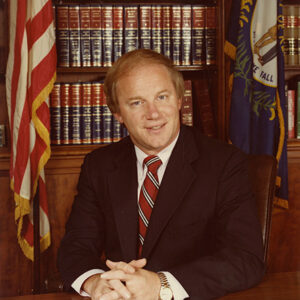calsfoundation@cals.org
David Love Armstrong (1941–2017)
David L. Armstrong was born in Arkansas but had a long and distinguished career in Kentucky law and politics, serving as the commonwealth’s attorney general, mayor of Louisville, and chairman of the Kentucky Public Service Commission. A nationally known prosecuting attorney, he also was part of a delegation of prosecutors that visited the Soviet Union and served as a delegate to a United Nations mission in Austria.
David Love Armstrong was born on August 6, 1941, in Hope (Hempstead County), where his maternal grandfather, Thompson Evans, was the railroad express manager and an alderman. The son of Elizabeth Evans Armstrong and Lyman Guy Armstrong, he grew up in Madison, Indiana, where he graduated from Madison High School. He attended Hanover College and received a BS from Murray State University and a JD from the University of Louisville Brandeis School of Law. He married Carol Burress on November 29, 1963. The couple had two children, Bryce and Shannon.
Following appointive positions as a juvenile court judge and an administrative law judge, Armstrong, a Democrat, was elected Commonwealth’s Attorney for Jefferson County, Kentucky, in 1975 and reelected in 1983. During his tenure as prosecutor, he established the first career criminal program in the nation, was one of the first state prosecutors to implement a computer case tracking system, was recognized by President Jimmy Carter as one of the “Ten Outstanding Prosecutors in America,” and served as president of both the Kentucky Commonwealth’s Attorneys Association and the National District Attorneys Association.
In 1983, he was elected Kentucky’s attorney general. During his term, he served as vice chair of the United States Attorney General’s Advisory Board of Missing Children and was elected by his peers to serve as chair of the Southern Association of Attorneys General.
Elected in 1989 and reelected in 1993 as Jefferson County, Kentucky, Judge Executive, he was recognized for creating the Office for Women, establishing a highly regarded victim notification system, erecting a new jail and new courthouse, developing the Riverport Business Park, and serving as president of the County Executives of America. In 2002, he was given the Communicator of the Year award from the International Association of Business Communicators and Public Relations Society of America.
In 1998, he was elected mayor of Louisville, receiving more than seventy-five percent of the vote. Of particular note were his redevelopment of the failing downtown Louisville Galleria into the Fourth Street Live entertainment district, the creation of the Downtown Housing Fund, and the enactment of numerous affordable housing and environmental initiatives. He also created the internationally recognized Louisville Extreme Park skate park, which was later named the David Armstrong Extreme Park.
From 2008 to 2015, he served as chairman of the Kentucky Public Service Commission, which regulates intrastate rates and services of over 1,500 Kentucky utilities, and as a member of the board of directors of the National Association of Regulatory Utility Commissioners.
In 1978, he served as a member of the first delegation of United States prosecutors to visit the Soviet Union to deal with a variety of issues, including due process, emigration laws, and human rights. In Moscow, he met formally with Soviet Procurator General Roman Rudenko (a position similar to the U.S. Attorney General), as well as informally with well-known dissidents including Dr. Benjamin Levich. In 1979, he served as one of two U.S. delegates to the United Nations Mission on Prosecutorial Discretion in Vienna, Austria.
Between elective offices, he was engaged in the private practice of law and served as Scholar in Excellence at the University of Louisville School of Business, College of Urban Studies.
Armstrong was a member of many civic boards as well as serving as chairman of the Kentucky Coalition Against Rape and Sexual Assault, Jefferson County Domestic Violence Coordinating Council, and American Cancer Society/Kentucky Chapter. He received honorary doctorate degrees from Hanover College, Murray State University, and Spalding University.
Armstrong died on June 15, 2017, at his home in Louisville.
For additional information:
Franke, Irving. “Commonwealth’s Attorney Sees Activists in Russia.” Louisville Community, a publication of the Jewish Community Federation of Louisville, October 27, 1978.
Nold, James, Jr. “Mayor in the Middle.” Louisville Magazine, January 2012.
Roth, Marcia. “Armstrong Leaves National Legacy.” Courier Journal, June 16, 2017.
Russell, Jim. “Soviet Justice: Is It a System of Trial and Terror? In Quest of the Truth, 12 U.S. Prosecutors, Including One from Kentucky, Mix Protocol and Intrigue in Russia.” Courier Journal Magazine, January 14, 1978.
Shafer, Sheldon S. “Former Mayor, Judge-Executive Armstrong Remembered at Service.” Courier Journal, July 7, 2017.
Alfred S. Joseph III
Louisville, Kentucky
 Divergent Prosperity and the Arc of Reform, 1968–2022
Divergent Prosperity and the Arc of Reform, 1968–2022 Politics and Government
Politics and Government David Armstrong
David Armstrong 




Comments
No comments on this entry yet.